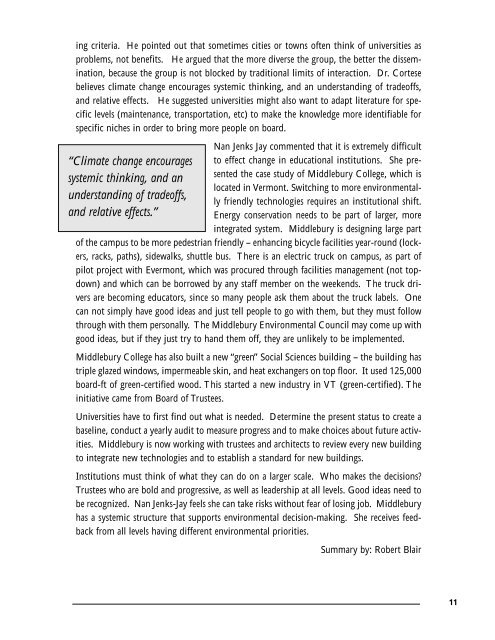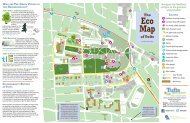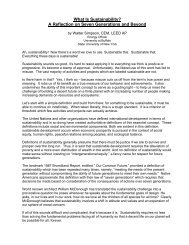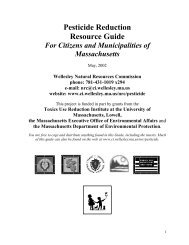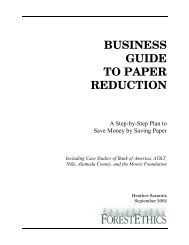Conference - Office of Sustainability - Tufts University
Conference - Office of Sustainability - Tufts University
Conference - Office of Sustainability - Tufts University
You also want an ePaper? Increase the reach of your titles
YUMPU automatically turns print PDFs into web optimized ePapers that Google loves.
ing criteria. He pointed out that sometimes cities or towns <strong>of</strong>ten think <strong>of</strong> universities as<br />
problems, not benefits. He argued that the more diverse the group, the better the dissemination,<br />
because the group is not blocked by traditional limits <strong>of</strong> interaction. Dr. Cortese<br />
believes climate change encourages systemic thinking, and an understanding <strong>of</strong> trade<strong>of</strong>fs,<br />
and relative effects. He suggested universities might also want to adapt literature for specific<br />
levels (maintenance, transportation, etc) to make the knowledge more identifiable for<br />
specific niches in order to bring more people on board.<br />
Nan Jenks Jay commented that it is extremely difficult<br />
to effect change in educational institutions. She presented<br />
the case study <strong>of</strong> Middlebury College, which is<br />
located in Vermont. Switching to more environmentally<br />
friendly technologies requires an institutional shift.<br />
Energy conservation needs to be part <strong>of</strong> larger, more<br />
integrated system. Middlebury is designing large part<br />
<strong>of</strong> the campus to be more pedestrian friendly – enhancing bicycle facilities year-round (lockers,<br />
racks, paths), sidewalks, shuttle bus. There is an electric truck on campus, as part <strong>of</strong><br />
pilot project with Evermont, which was procured through facilities management (not topdown)<br />
and which can be borrowed by any staff member on the weekends. The truck drivers<br />
are becoming educators, since so many people ask them about the truck labels. One<br />
can not simply have good ideas and just tell people to go with them, but they must follow<br />
through with them personally. The Middlebury Environmental Council may come up with<br />
good ideas, but if they just try to hand them <strong>of</strong>f, they are unlikely to be implemented.<br />
“Climate change encourages<br />
systemic thinking, and an<br />
understanding <strong>of</strong> trade<strong>of</strong>fs,<br />
and relative effects.”<br />
Middlebury College has also built a new “green” Social Sciences building – the building has<br />
triple glazed windows, impermeable skin, and heat exchangers on top floor. It used 125,000<br />
board-ft <strong>of</strong> green-certified wood. This started a new industry in VT (green-certified). The<br />
initiative came from Board <strong>of</strong> Trustees.<br />
Universities have to first find out what is needed. Determine the present status to create a<br />
baseline, conduct a yearly audit to measure progress and to make choices about future activities.<br />
Middlebury is now working with trustees and architects to review every new building<br />
to integrate new technologies and to establish a standard for new buildings.<br />
Institutions must think <strong>of</strong> what they can do on a larger scale. Who makes the decisions?<br />
Trustees who are bold and progressive, as well as leadership at all levels. Good ideas need to<br />
be recognized. Nan Jenks-Jay feels she can take risks without fear <strong>of</strong> losing job. Middlebury<br />
has a systemic structure that supports environmental decision-making. She receives feedback<br />
from all levels having different environmental priorities.<br />
Summary by: Robert Blair<br />
11


